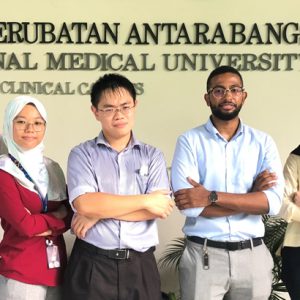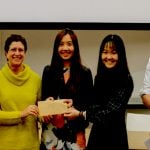At IMU, nursing students are encouraged to participate in the mobility programme to enrich our learning and broaden our professional perspectives. This incredible opportunity lets us experience healthcare systems in different countries or specialize in areas that deeply interest us.
I chose to complete my attachment in the oncology and palliative care unit. My interest in exploring the specialised roles of oncology nurses and how end-of-life care can be integrated to improve their quality of life was ignited during my previous hospital attachment when I witnessed patients battling various types of cancer. I am extremely grateful that the National University Hospital (NUH), Singapore, approved my request for a two-week clinical attachment at the National University Cancer Institute (NCIS), a national specialist centre that treats both paediatric and adult cancers under one roof.
On my first day, I received an orientation on the hospital’s system and structure, followed by a comprehensive tour through various departments in both inpatient and outpatient settings, such as the specialist clinic, apheresis unit, and radiotherapy and chemotherapy centers.

I also had the opportunity to observe limb cryocompression therapy—a technology that delivers compression and cooling therapy to help manage pain and sensitivity in the hands and feet caused by chemotherapy, commonly known as chemotherapy-induced peripheral neuropathy (CIPN).
In the subsequent days, I was assigned to work with registered nurses in the oncology ward. During this time, I had the opportunity to observe a variety of cancer cases and rare treatment complications, such as Stevens-Johson Syndrome. Through the interactions with patients, many of whom were willing to share their experiences living with cancer which helped me better understand the disease itself and its physiological impact. I also learned about the various treatment options available for cancer patients beyond surgery including chemotherapy, radiation therapy, immunotherapy, targeted therapy, and stem cell therapy. Due to the cytotoxic nature of chemotherapy, the oncology nurses in the ward are specially trained to administer these medications, and I was able to see the entire process firsthand.
In addition, I was fortunate to witness bedside stem cell harvesting for an autologous stem cell transplant in a patient with leukaemia. The process was fascinating, as the nurse explained each step and outlined the key aspects of the patient’s condition that needed to be monitored.
During my second week of attachment, I was assigned to the palliative care team which is made up of healthcare professionals of varied disciplines including nurses, physicians, physiotherapists, and social workers. Being able to follow the team as they conducted their ward round was an eye-opening experience into the realities of end-of-life care. They emphasise not only addressing physical symptoms but also recognising and supporting the psychological and spiritual needs of both patients and their families.
At that time, I had the opportunity to learn how to identify the dying trajectory, assess the signs of dying, manage discomfort such as breathlessness and pain, facilitate compassionate discharges, guide advance care planning, and support family involvement in the care process.
One of the most memorable moments for me was seeing how the team and family collaborated to fulfil the patient’s wishes. Realising that the patient might not be able to visit Japan as planned, the team and the children worked together to arrange a private room and beautifully decorated it with a Japanese theme to surprise the patient, creating a heart-warming memory for the patient and their loved ones. The compassionate approach the palliative care team took in delivering holistic care to patients in their final stages of life was truly inspiring and has left a profound impact on my nursing journey.
I am grateful to the National University Hospital for providing me with this invaluable learning opportunity to experience a healthcare system outside of Malaysia, and to my assigned clinical instructors who guided me in achieving my learning objectives.

They carefully planned the learning activities, provided additional learning resources, encouraged me to observe different procedures in the ward, and helped me apply the knowledge I had gained to real case scenarios. I also had the opportunity to attend an insightful talk on End-of-Life Nursing Education Consortium (ELNEC) Geriatrics, which focused on geriatric syndromes.
Moreover, I truly appreciate the positive working environment at the hospital, where nurses collaborate with all members of the healthcare system in an atmosphere of mutual respect and trust, despite the differences in nationality, all committed to improving patient outcomes.
Finally, I am thankful to my lecturers for their assistance throughout the application process and their unwavering support during the programme.
Written by Ah Hui Gi, Cohort NU1/20
Reviewed by Dr Chang Woan Ching, Lecturer, Nursing Division, IMU University









